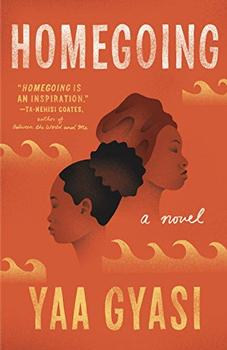Summary | Excerpt | Reading Guide | Reviews | Beyond the Book | Readalikes | Genres & Themes | Author Bio

Matters were only made worse by Effia's blossoming beauty. When she was twelve, her breasts arrived, two lumps that sprung from her chest, as soft as mango flesh. The men of the village knew that first blood would soon follow, and they waited for the chance to ask Baaba and Cobbe for her hand. The gifts started. One man tapped palm wine better than anyone else in the village, but another's fishing nets were never empty. Cobbe's family feasted off Effia's burgeoning womanhood. Their bellies, their hands, were never empty.
In 1775, Adwoa Aidoo became the first girl of the village to be proposed to by one of the British soldiers. She was light-skinned and sharp-tongued. In the mornings, after she had bathed, she rubbed shea butter all over her body, underneath her breasts and between her legs. Effia didn't know her well, but she had seen her naked one day when Baaba sent her to carry palm oil to the girl's hut. Her skin was slick and shiny, her hair regal.
The first time the white man came, Adwoa's mother asked Effia's parents to show him around the village while Adwoa prepared herself for him.
"Can I come?" Effia asked, running after her parents as they walked. She heard Baaba's "no" in one ear and Cobbe's "yes" in the other. Her father's ear won, and soon Effia was standing before the first white man she had ever seen.
"He is happy to meet you," the translator said as the white man held his hand out to Effia. She didn't accept it. Instead, she hid behind her father's leg and watched him.
He wore a coat that had shiny gold buttons down the middle; it strained against his paunch. His face was red, as though his neck were a stump on fire. He was fat all over and sweating huge droplets from his forehead and above his bare lips. Effia started to think of him as a rain cloud: sallow and wet and shapeless.
"Please, he would like to see the village," the translator said, and they all began to walk.
They stopped first by Effia's own compound. "This is where we live," Effia told the white man, and he smiled at her dumbly, his green eyes hidden in fog.
He didn't understand. Even after his translator spoke to him, he didn't understand.
Cobbe held Effia's hand as he and Baaba led the white man through the compound. "Here, in this village," Cobbe said, "each wife has her own hut. This is the hut she shares with her children. When it is her husband's night to be with her, he goes to her in her hut."
The white man's eyes grew clearer as the translation was given, and suddenly Effia realized that he was seeing through new eyes. The mud of her hut's walls, the straw of the roof, he could finally see them.
They continued on through the village, showing the white man the town square, the small fishing boats formed from hollowed-out tree trunks that the men carried with them when they walked the few miles down to the coast. Effia forced herself to see things through new eyes, too. She smelled the sea-salt wind as it touched the hairs in her nose, felt the bark of a palm tree as sharp as a scratch, saw the deep, deep red of the clay that was all around them.
"Baaba," Effia asked once the men had walked farther ahead of them, "why will Adwoa marry this man?"
"Because her mother says so."
A few weeks later, the white man came back to pay respects to Adwoa's mother, and Effia and all of the other villagers gathered around to see what he would offer. There was the bride price of fifteen pounds. There were goods he'd brought with him from the Castle, carried on the backs of Asantes. Cobbe made Effia stand behind him as they watched the servants come in with fabric, millet, gold, and iron.
When they walked back to their compound, Cobbe pulled Effia aside, letting his wives and other children walk in front of them.
"Do you understand what just happened?" he asked her. In the distance, Baaba slipped her hand into Fiifi's. Effia's brother had just turned eleven, but he could already climb up the trunk of a palm tree using nothing but his bare hands and feet for support.
Excerpted from Homegoing by Yaa Gyasi. Copyright © 2016 by Yaa Gyasi. All rights reserved. No part of this excerpt may be reproduced or reprinted without permission in writing from the publisher.
Your guide toexceptional books
BookBrowse seeks out and recommends the best in contemporary fiction and nonfiction—books that not only engage and entertain but also deepen our understanding of ourselves and the world around us.